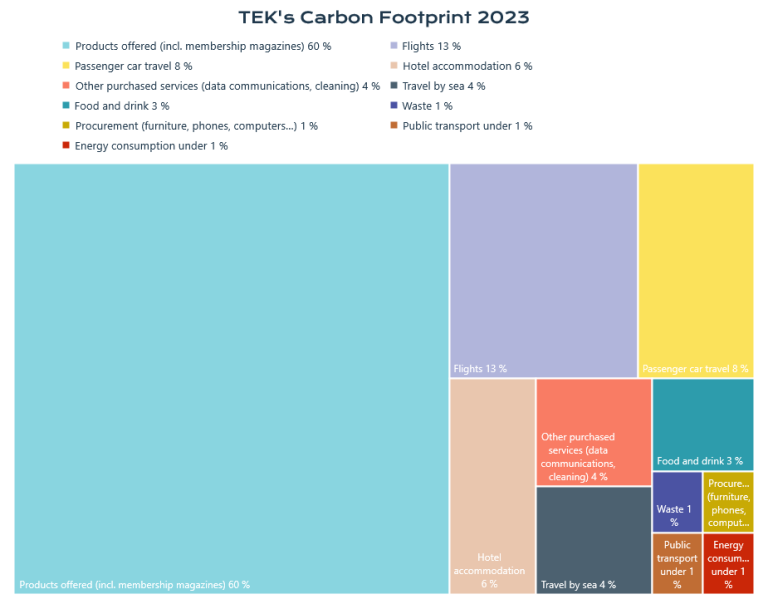
The total emissions of the Academic Engineers and Architects in Finland TEK decreased last year from 366 to 312 carbon dioxide equivalents. The biggest change is in travel emissions, which fell by 40 per cent from 2022, during which air travel was exceptionally common.
The carbon dioxide equivalent is a joint measure of greenhouse gas emissions that can be used to add up the effect of various greenhouse gas emissions on the acceleration of the greenhouse effect.
“We have already performed the easiest and fastest reductions, so no major drop in emissions is expected in the next few years unless, for example, the Tekniikka&Talous magazine makes its product carbon neutral. However, we are gradually moving towards lower emissions as, for example, digital subscriptions to magazines are on the rise and electric cars are becoming mainstream,” says Jussi-Pekka Teini, TEK’s Expert on Engineering Sustainability, who performed the calculation.
Teini has made a couple of minor changes to the calculation.
“Catering emissions are no longer calculated separately every year, as they remain quite stable and constitute such a small fraction of total emissions that the input-output ratio does not support an annual calculation. A suitable calculation interval is every 3–4 years. A similar practice is already in place for waste,” says Jussi-Pekka Teini.
“Then again, as electric cars are becoming more popular and the market share of diesel cars is decreasing, the breakdown of passenger car kilometres by vehicle type will be reviewed annually.”
TEK’s Board has decided on emission offsetting, or what are now known as offsetting claims, whereby an equivalent quantity of emissions is offset or sequestered elsewhere. This year, TEK is participating in an Ethiopian afforestation project, an Indian small hydropower and solar energy project, and a biochar project in Germany. All this costs around €15,000 in total. This will make TEK a carbon-neutral organisation.
“In the future, we can encourage members to subscribe to digital magazines if they don’t read print editions, and encourage our staff and shop stewards to avoid air travel.”
TEK’s carbon footprint 2023
- Products offered (incl. membership magazines) 60 %
- Flights 13 %
- Passenger car travel 8 %
- Hotel accommodation 6 %
- Other purchased services (data communications, cleaning) 4 %
- Travel by sea 4 %
- Food and drink 3 %
- Waste 1 %
- Procurement (furniture, phones, computers…) 1 %
- Public transport under 1 %
- Energy consumption under 1 %
